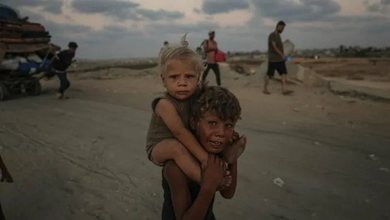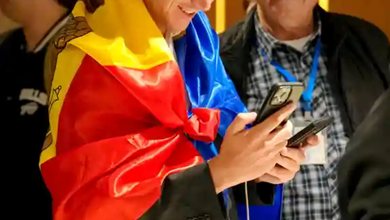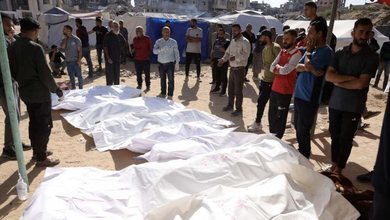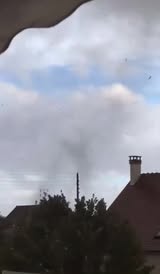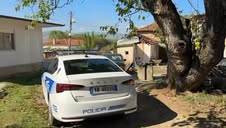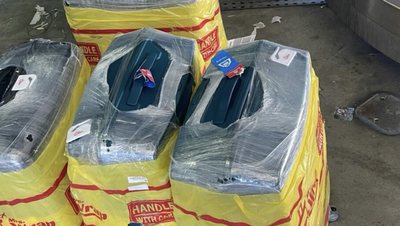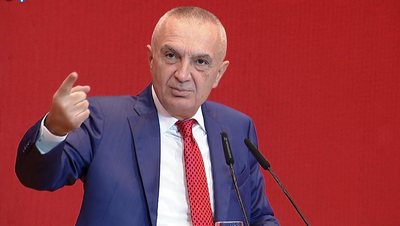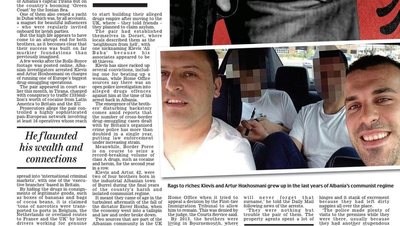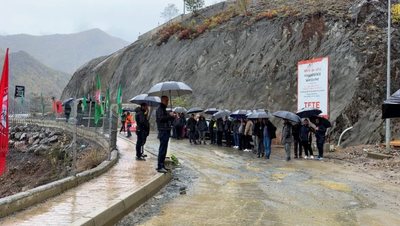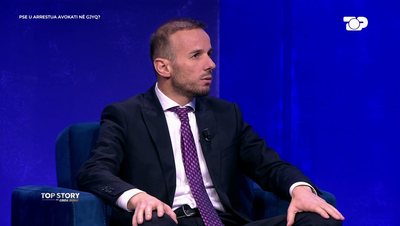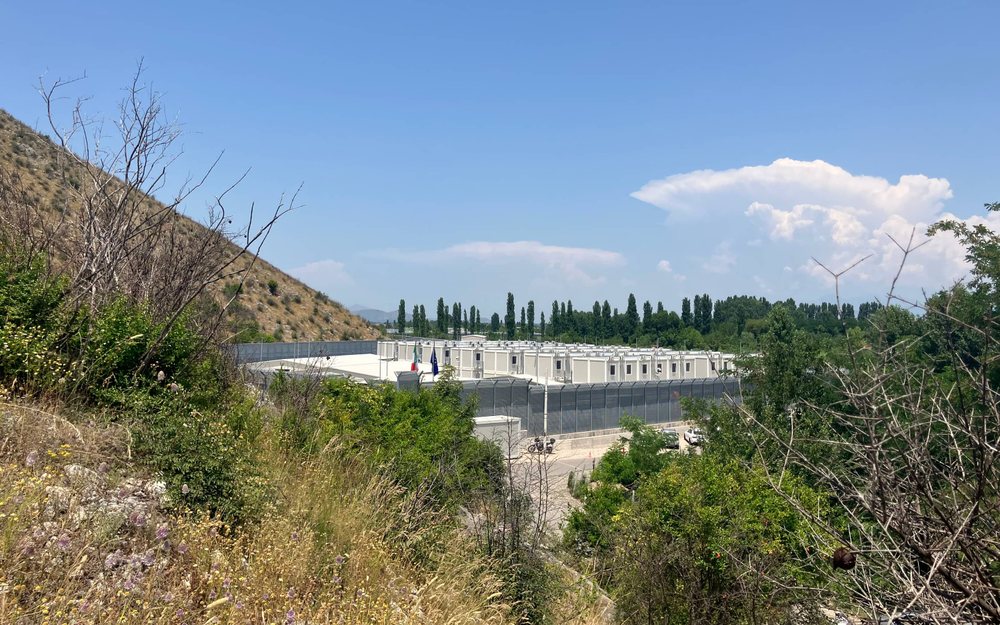
The well-known German newspaper "Süddeutsche Zeitung" has dedicated a report to the refugee camps in Albania. Journalist Lina Verschwele writes that for the first time in the history of the EU, a member state is locking people up in a place that most of them have never set foot in before.
The report states that Albania's Prime Minister, Edi Rama, signed the agreement with Italy, likely bringing his country closer to its long-awaited membership in the European Union.
Full report: “The dark side of Europe”
The place of great promise lies along a dusty road, about an hour and a half drive from the Albanian capital, Tirana. After a bend, it appears suddenly: high metal fences surround the center of Gjadri, and the flags of Italy and the European Union flutter from flagpoles.
One morning in mid-June, Rachele Scarpa, 28, gets out of a rental car here. She is wearing slacks and a loose-fitting T-shirt. The thermometer is already reading almost 30 degrees. The Italian Democratic Party MP has been here several times before, accompanied by lawyers. She is one of the few who knows the center from the inside and one of the few who speaks publicly about it. Most people, including journalists, are not allowed to visit.
It’s been almost a year since the Italian government, under Giorgia Meloni, launched this controversial experiment. On October 11, 2024, it opened two immigration centers in Albania – this one here in Gjadra and another in Shëngjin, right next to the Adriatic. Since then, more than 200 migrants have been intercepted in the Mediterranean and sent from Italy to Albania. Locked up and isolated from the public, here – outside the EU’s borders – they would have to go through an accelerated asylum procedure for up to 3,000 refugees a month. That was the plan.
After several court cases, which will be discussed below, the Italian government has now transformed its immigration centers in Albania into detention institutions for men who, according to it, are forced to leave the country. Into deportation prisons.
MPs from across Europe have followed the Italian project from the beginning.
European Commission President Ursula von der Leyen praised the initiative. Meloni, before the centers opened, declared that their “most useful element” was their “extraordinary deterrent effect” on migrants seeking to reach Europe. Italy’s ambassador to Albania then clarified again that the “top priority” was, of course, respect for human rights.
A delegation from the German embassy has also visited the center in the barren hills of Albania to see how deportations through third countries could work. The possibility of using the “Albanian model” for Germany, as German Interior Minister Alexander Dobrindt of the CSU suggested in July, has even been explored.
At the time, Dobrindt had invited five counterparts from neighboring countries to a “summit” on the Zugspitze. From there, the main aim was to convey the message that someone was in control. “Germany,” Dobrindt said, “is no longer in the ‘last carriage’ of immigration policies, but ‘in the locomotive’.” “Repatriations,” for example, were to be carried out in the future without “bureaucratic obstacles” from third countries. Government sources say that Germany is itself negotiating with several countries for agreements similar to what Italy has with Albania. Officially, the Interior Ministry writes that it does not comment on “possibly ongoing or planned talks.”
Thus, in Albania, the political promise to keep foreigners away from Europe now clashes with the immigrants' hope for a better life. And also with the instinct of some parties to exploit all of this for their own interests - financial or political.
Is all this legal?
For the first time in the history of the EU, a member state is locking people up in a place most of them have never set foot in before. Since then, courts from Rome to Luxembourg have been debating whether this is permissible. It is about the big issue – about the right to asylum, but also about the desire for control. Above all, it is about people: about Bangladeshi men who managed to reach Italy from Albania, about an Algerian who was deported despite talking about suicide, and about a Moroccan who ended his life.
For this research, the Süddeutsche Zeitung newspaper analyzed documents and acts, spoke to lawyers and doctors about the “Albanian model,” and accompanied MPs and lawyers on their visits to the controversial center – like Rachele Scarpa that morning in mid-June. She traveled to Gjadri with a small delegation. The lawyers from Rome were still filling out forms when Scarpa knocked on the door. For a few moments, the heavy gate allowed us a glimpse inside: gray and white containers, concrete, security cameras, and loudspeakers.
“When I first came here,” Scarpa says, “it felt like an alien place.” It was October 2024. Since then, Scarpa and her team have spoken to dozens of migrants at the center. “Many of them don’t understand what’s going on. Why they’re here. They feel isolated.” Italy can keep the men here for up to a year and a half to 18 months, their gaze always falling on the same hills, the same walls, the same fence.
Meloni's government has made great efforts for the "Albanian model": an Italian company takes care of the supplies, the beds, the food. The Italian police and officials deal with legal matters internally, while the laws from Rome are implemented in the center. Albania only provides the land and a few police officers outside the perimeter. When you ask them what and who exactly they are guarding, that morning none of them knows the answer.
Scarpa keeps coming back, because he thinks someone should check whether legal standards here really are a “high priority,” as the Italian ambassador said. This includes the question of whether detainees have access to lawyers and doctors. And, of course, whether it was legal to bring them here at all. There have always been doubts about this, and Italy has already had to abandon its original model.
Almost a year ago, Italian navy ships brought the first refugees to Albania. Three times – in October, November and January – the Italians had stopped in the Mediterranean boats at risk of crossing the dangerous route from Libya to Italy. An agreement between Italy and Albania defined exactly who Italy could bring to Albania – in short: adult men from so-called safe countries of origin who are psychologically stable and physically healthy.
In order to complete the asylum procedures for a total of 73 men in just 28 days, Meloni’s government last autumn declared nineteen countries of origin as “safe”, including Bangladesh and Egypt. A court in Rome, however, saw this as an EU competence and referred the case to Luxembourg. There, the European Court of Justice ruled in August that member states can assess the safety of countries of origin themselves, but must justify this assessment in a reasoned manner. In other words: what is called “safe” must really be safe.
Anyone who is deported must first return to Italy
Other criteria have also been deemed violated by Italian courts when they ordered the migrants to be returned to Italy – their original destination. There were, for example, minors, says Scarpa, or an HIV patient, as well as men who had apparently been tortured in Libya before they set off. In January, the Italian government’s latest attempt to implement the accelerated procedures originally planned in Albania failed at the Court of Appeal in Rome. Since then, the centre in Shëngjin has remained empty. The Italian Interior and Health Ministries have not responded to any questions about the centres.
However, Italy has not given up on the “Albanian model”: in April, asylum centers were transformed into detention facilities for men that Meloni’s government wants to deport. Italy can now keep these men here in Gjadra for up to 18 months – but the government cannot keep them outside Italy, as was the original idea. Even those who are deported from Albania must first return to Italy, because that is what the law requires. And those who are not ultimately deported can still return to Italy.
This has created a kind of competition between those who want to deport and those who fight for the rights of migrants to stay. During her visit to Gjadra in June, Rachele Scarpa counted a total of 31 migrants in the center – just a small fraction of the 3,000 originally envisaged in the agreement.
To identify the most urgent cases, Scarpa bases her work on a register of “critical events.” In these reports, the company that manages the center must record, among other things, suicide attempts, acts of self-harm and protests. Since the Italian government does not publish these figures and outsiders do not have access to them, Scarpa counted them herself: 65 cases were recorded on her table between April and June 2025. “Reports of hanging attempts” – ten cases. Self-harm described as “demonstrative”, including “prevented hanging attempts” – thirteen. Reports of “self-harm (scratches and cuts)” – nine. And one report of an “attempt to sew up the mouth.”
The reports do not list people by name, but only by numbers. Scarpa and her team are now trying to link these numbers back to specific names. Other MPs also regularly travel to Gjadri to gather information, to avoid – in their opinion – the place becoming a “black box”.
It is now dark, tourists stroll along the seashore, while Scarpa sits with her team in a small restaurant. The Albanian coast is famous for its white sand and clear water. But Rachele Scarpa has no eyes for that now – she is talking about new cases. It is about security issues, about questions about how detainees can be hung from fire detectors, or about a clearly confused person who believes he is in Italy. It is about knowing which lawyers are pursuing which cases and what can be learned concretely on the ground. Sometimes it all sounds like a covert operation. Again and again, it is about cases that according to Scarpa violate the law in force – like that of an Algerian.
Many people in the area have themselves emigrated abroad. Why should they be against these people?
A "critical event" was also registered for him in Gjadra. According to documents, the 23-year-old had lived in Italy for about three years without documents. In October 2022, he received a deportation order. This is according to his lawyer's complaint.
In early January of this year, the Algerian was initially detained in Sardinia for deportation. A few months later, on May 5, he was visited by two doctors there. Their report states that he had been cooperative, “but unable to listen properly to the examiners.” His emotional state fluctuated between anger, despair, fear and hopelessness. These are conditions that doctors constantly observe in detention centers. “He describes death by suicide as the only solution,” the report quotes, adding: “Suicidal thoughts are present.” The patient also had self-harm wounds and had reported several attempts to hang himself.
In the end, the doctors prescribed the patient Rivotril, an anti-epileptic drug that is used “off-label” as a sedative. They recommended that the deportation center provide him with some activity to help improve his condition.
Two days later, the man was transferred to Albania instead. His lawyer writes in the complaint filed with the Rome court that his client “had not received any written notice of this” and “was not even informed of the destination.”
During his detention pending deportation in Gjadra, the Algerian later told an interpreter that he had swallowed pieces of glass. Whether this actually happened or not cannot be clarified today. For such cases, according to Italian law, there is a so-called “vulnerability commission”, where doctors must assess whether the continuation of detention pending deportation is still reasonable for him. His lawyer is now demanding that the competent police department also provide an answer to this.
But for them, the case seemed to be closed. In their response to the lawyer's question on May 31, they said that the man was no longer in Gjadra. He had been deported to Algeria – with an intermediate stopover in Italy – while he was still undergoing examinations.
The lawyer has now requested a re-entry visa for his client due to what he calls his “illegal expulsion.” The hearing is scheduled for mid-October in Rome. Will it have any effect? It is unknown. The lawyer says that since the expulsion he has not been able to contact his client. The Italian ministries of Health and Interior have also not responded to this issue.
In Gjadra, the man had said: "If they expel me, I will commit suicide."
It is not an isolated case that suicidal thoughts among refugees are not taken seriously – some consider them empty threats. But data from the organization "Doctors Without Borders" shows an extremely high level of suicide in detention centers for deportation. The main reasons are, above all, a lack of hope and a loss of control over their lives.
In the spring, another case made headlines in Italy. Hamid Badoui, a Moroccan, had been briefly in Gjadra in April. A party colleague of Scarpa’s had met him as one of the last: “He was very worried,” she says five months later on the phone. Badoui feared that he would never be able to see his heart-stricken mother in Italy again and that he would be deported to his homeland, which, after many years in Italy, now seemed foreign to him. Already in Gjadra, Badoui had said: “If they deport me, I will kill myself.”
Apparently, Badoui was released from the center due to protective measures in place and returned to Turin. Shortly after, he was arrested again for unclear reasons and sent to prison. There, in May, he hanged himself.
In Gjadra, a photo of Hamid Badoui is taped to the base of the metal fence surrounding the center: a man with dark hair, a batik T-shirt, and jeans. Activists have placed the photo here and left flowers in front of it. In a warehouse, someone spray-painted the words “Justice for Hamid.”
His story is posted on leaflets on information boards and lampposts. "We wanted to at least bring one of them out of anonymity," one activist said during a meeting in June.
Rumors have long circulated in the village about the men behind that fence – rumors that are not true. In the market square, Albanian teenagers recount what they have heard: “They are all very weak,” says one. “They are dangerous criminals,” adds another.
Gjadri is a small village, with only a few hundred inhabitants. At first, politicians also made a promise to the residents: the center would bring new jobs – someone had to pour concrete floors, drive fence posts into the ground, cooks and cleaners were needed. But after losing several court battles, the center remained empty for months – the management company Medihospes laid off employees.
Most of them don't want to talk about work. "Private matter," says a security guard and drives away in his car. An interpreter says he is forbidden to talk about work.
Of course, Albania hopes that this will help them on their path to EU membership.
However, a cousin of the security guard tells a story. He is sitting in a cafe drinking a can of juice. His cousin earns, he says, a thousand euros a month for his work at the center – a large sum for Gjadri. He walks through the village to show what it means, passing large houses with shuttered windows. Most of the owners have emigrated abroad themselves for better jobs. He too is just visiting; he has been living in the US for ten years.
“There used to be twice as many people living in the village,” he says. But after the fall of Enver Hoxha’s communist dictatorship, many Albanians emigrated to Italy. “How can we be against them?” the cousin says of the men behind the fence. “We are immigrants ourselves, and they welcomed us with open doors.”
So why Albania?
It's not long since Albania offered its help once again. In 2021, when the Taliban occupied Kabul, the country accepted more than a thousand refugees. At the time, Prime Minister Edi Rama talked about hospitality: refugees were housed in hotels right on the Adriatic. NGOs paid for rooms with a sea view, and a buffet was served three times a day. For months, Afghans waited like this for their visas. But it's not just Europe that has changed since then.
One of these hotels is Rafaelo Resort. The complex is located just a thirty-minute drive from Gjadri, and right at the entrance you are greeted by a replica of the Statue of Liberty. Today, tourists are once again sunbathing by the pools. So are the Italian police officers working at the deportation center.
When Albania’s Prime Minister, Edi Rama, signed the agreement with Italy, he likely tied it to the expectation that his country would move closer to its long-awaited membership in the European Union. However, it is still unclear whether this will actually happen. In a response to the press, the German Foreign Ministry stated that Albania is a “close partner” of Germany and that cooperation with it will be expanded. Along with this response, the ministry also sent a series of confidential documents from last year, which could help to understand how the German embassies in Rome and Tirana assess the agreement with Albania.
The Süddeutsche Zeitung (SZ) newspaper obtained these documents through an official request under the Freedom of Information Act. But almost every comment or assessment of the agreement was deleted or blacked out.
"Common objectives with Albania and Italy could be 'at risk,'" the ministry wrote. Whether deportation centers are included in this warning remains unclear.
On October 4, the German Interior Minister has called another meeting on immigration, this time in Munich. There, according to sources, Dobrindt will also address the topic of "third country models" like the one in Albania.
This model has cost Italian taxpayers so far – according to estimates – between 670 million and one billion euros.
In Rome, the government continues to be reticent when asked about the results of the Albanian model. The Interior Ministry does not make public how many people have been deported from Albania so far.
Many Bangladeshi citizens who arrived by boat across the Mediterranean and were taken to Albania now live in Italy: some have been granted asylum, while others are still in the process. The Gjadri center currently houses only about twenty men, while the one in Shëngjin has been empty since Italy abandoned the idea of bringing refugees directly from the Mediterranean to Albania.
A joint analysis by the University of Bari and Action Aid shows that each seat in Albania in 2024 cost more than five times as much as a similar seat in Italy.
For MP Rachele Scarpa, the result is clear: "It's all so meaningless. The cost, the effort, the suffering. Isn't it all just a big propaganda stunt?"




